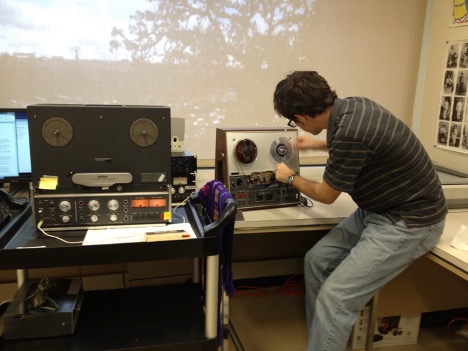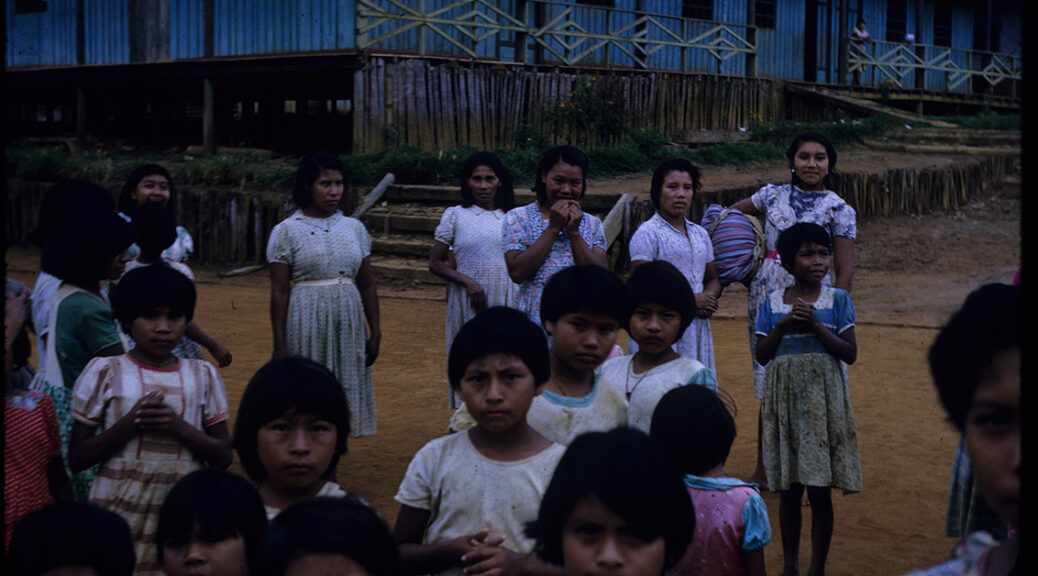“When you lose a language and a language goes extinct, it’s like dropping a bomb on the Louvre.” –Linguist Michael Krauss
Language is so central to humanity that it frequently takes on the involuntary characteristics of breathing or eating—words seemingly form in our minds and fall effortlessly from our mouths or onto a page in a way that can go without notice or concern. It’s only when we lose our ability to communicate that we realize how important a shared language is to our collective experience, and a better understanding of ourselves.
Such is the inspiration at the heart of the Archive of the Indigenous Languages of Latin America (AILLA), a digital repository of multimedia resources in and about the indigenous languages of Latin America, founded in 2000 at The University of Texas at Austin and located today at the Nettie Lee Benson Latin American Collection.
The archive’s mission is the preservation of the wealth of recordings of natural discourse in the indigenous languages of Latin America made by native speakers of the languages, frequently in collaboration with linguists and anthropologists, during the past fifty to sixty years. Most of these languages are endangered, and all of them are at risk of being replaced by dominant languages. Some of them, in fact, like Tehuelche, a Chonan language of Patagonia, have lost all speakers since the recordings housed in the archive were made.
According to the World Bank, there are some 560 different languages spoken in Latin America, most of which are spoken by Indigenous Peoples. Some, like the Mayan languages K’iche’ (Guatemala) and Yucatec Maya (Mexico), have speakers numbering in the hundreds of thousands. But there are examples that more fully demonstrate a need for preservation, such as Guató (Brazil) and Kawésqar (Chile), each having fewer than 10 living speakers.
AILLA’s collections represent over 420 Indigenous languages, and include audio and video recordings, some with transcriptions and translations in Spanish, English, and to a lesser extent Portuguese, as well as photographs, maps, charts, and written works of all kinds. The recordings include narratives, songs, conversations, prayers, ceremonies, oral histories, interviews, and grammatical elicitation. Written materials include grammars, dictionaries, word lists, ethnographies, field notes, journals, correspondence, theses and dissertations, published and unpublished academic articles, essays, and manuscripts, as well as original literary works in indigenous languages, such as poetry, short stories, and novels. There is ongoing work to incorporate textbooks and teaching materials for bilingual and ethno-education and for language reclamation programs into the archive,
“Every language is like a cosmos, containing vocabulary, stories, songs, spiritual beliefs, ceremonies, games, jokes, food ways, and patterns of thought which form a worldview that is unique in the history of humanity,” explains AILLA Manager Susan Kung.

AILLA’s Digital Content Curator Ryan Sullivant threads open-reel tape into an open-reel audio player/recorder in the AILLA lab. Austin, Texas, 2012.
AILLA collaborates directly and indirectly with Indigenous communities to archive their linguistic cultural heritage and coordinates the digitization of fragile analog materials in Indigenous languages so that they can be added to the archive. The archive accepts any material that was written or spoken in one of the indigenous languages of Latin America by native speakers of that language, on any topic, in any style. AILLA also collects materials of cultural and academic interest that are written about the indigenous languages of Latin America, and especially values items of interest to indigenous communities, like teaching materials and literary works.
An essential focus of the work at AILLA is to make these resources available to a global audience via unrestricted online access. Rapid technological development and an expanding internet has increased the reach of resources that were once kept in private offices and homes so that they can now be shared with speakers of the languages, scholars and interested audiences worldwide. By building out a broader global audience for these resources, the hope is that expanded access will extend and/or guarantee the life of at-risk languages.
“We want to support indigenous efforts to reclaim their languages and develop [their] literatures,” says Susan Kung. The archive makes it easy to publish indigenous works to a wide audience. It also serves as a medium of collaboration and communication, in addition to providing a repository for resources.
AILLA was founded in 2000 at The University of Texas at Austin by Dr. Joel Sherzer, Professor of Anthropology, and Dr. Anthony Woodbury, Professor of Linguistics, working in collaboration with a group of their graduate students, and with technical support from Mark McFarland, the former University of Texas Libraries Director of the Digital Library Services Division. AILLA’s pilot site was funded with seed money from the College of Liberal Arts, and the first online digital repository was built with funds from the National Endowment for the Humanities. Today, AILLA’s primary support comes from the University of Texas Libraries and the Lozano Long Institute of Latin American Studies, and AILLA is at the heart of the LLILAS Benson collaboration and its Indigenous languages initiatives.
Over AILLA’s 20-year history, staff have worked to make academia and the general public aware of the importance of archiving priceless and irreplaceable linguistic cultural heritage and to develop and promote best practices in this field. These endeavors, along with AILLA’s efforts to digitize and archive significant collections of indigenous language documentation materials, have been generously funded by grants from the National Endowment for the Humanities and the National Science Foundation.
To explore AILLA’s collections, visit ailla.utexas.org. The catalog information is open access, but you must register for a free account to stream, view or download media files.
If you are a speaker of an indigenous language and are interested in creating an archival collection for your language, please write to us at ailla@ailla.utexas.org.

